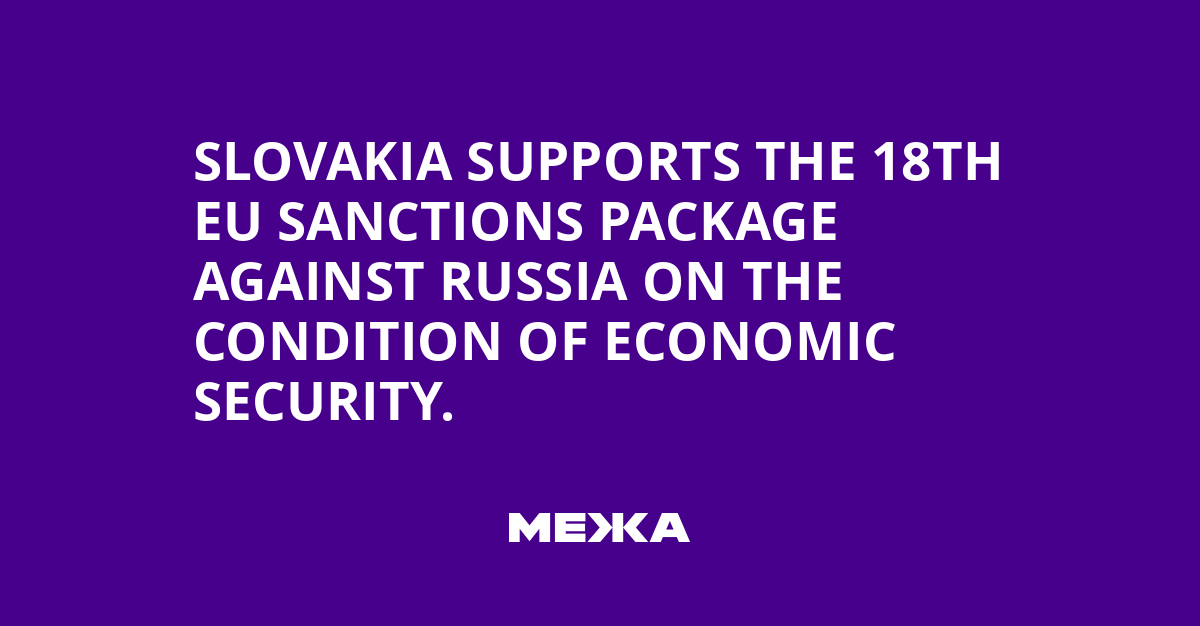In Slovakia, ministries have assessed the preliminary provisions of the EU’s 18th sanctions package against Russia. If no new points emerge, the country is ready to support this package, as it will not have a negative impact on the Slovak economy. This was reported by Juraj Blanár, the Minister of Foreign and European Affairs of the Slovak Republic.
At the EU Foreign Affairs Council meeting in Brussels, Blanár expressed Slovakia’s position on the 18th sanctions package.
“Negotiations on the 18th package are still ongoing, and we do not yet know its final wording. However, for Slovakia, it is politically absolutely crucial to move the discussion of the sanctions package to the European Council and link it with the so-called EU RePower proposal, which envisages a phased rejection of strategic raw materials from the Russian Federation. We have openly requested this from our partners.”
– Juraj Blanár
The minister noted that Slovakia has already evaluated the preliminary points of the package and, if nothing new arises, is ready to support it, as the sanctions will not harm the country’s economy.
Juraj Blanár also held a meeting with the French Foreign Minister Jean-Noël Barrot to discuss Slovakia’s position on the sanctions and the EU’s demands in case of disconnection from Russian energy resources.
This week, at the European Council meeting, Slovak Prime Minister Robert Fico will clearly express the government’s reservations and demands regarding the RePower EU initiative.
According to Blanár, disconnection from Russian gas and oil will have serious consequences for the Slovak and European economies, as well as lead to an increase in prices for end products.
“We are protecting our national interests from the impact of the EU RePower proposal, which will also involve raising transport fees on these goods, because Slovakia, as a country at the beginning of the chain, will become the country at the end.”
– Juraj Blanár
He also emphasized that one of the risks is a possible arbitration that could affect Slovakia in case of contract breaches.
“Billions of euros are at stake. We cannot afford such risks, so we are asking for guarantees on how these negative consequences for the Slovak Republic will be addressed.”
– Juraj Blanár
On Monday, Ukraine’s Foreign Minister Andriy Sybiha also participated in the Council meeting and informed about the situation in Ukraine. Juraj Blanár highly appreciated Ukraine’s readiness to achieve a ceasefire.
“Ukraine’s desire is to achieve a ceasefire by the end of this year. That is why we view the two other direct negotiations that took place in Istanbul between the Ukrainian and Russian delegations as a very positive step forward. Although positions are still not converging, it is important that the talks continue.”
– Juraj Blanár
EU ministers agreed that the Union must be an active participant in the diplomatic process and coordinate actions with the United States, which is trying to mediate for the quickest possible ceasefire.
Earlier, Hungary announced it was blocking the adoption of the EU’s 18th sanctions package against Russia along with Slovakia, but this information was not confirmed in Slovakia.
Slovakia is currently reviewing the sanctions proposals and primarily assessing their impact on the economy. Prime Minister Robert Fico emphasized that the country will not support the package unless it receives a clear energy security plan from the European Commission.
The European Commission stated that it will discuss Slovakia’s concerns about possible problems arising from the cessation of Russian energy supplies.
What is known about the EU’s 18th sanctions package against Russia
In June 2025, the European Commission presented the 18th sanctions package, which includes new restrictions for Russia’s energy and banking sectors. The sanctions also cover transactions related to the Nord Stream project.
Main provisions of the package:
Ban on all transactions related to Nord Stream 1 and 2 – EU operators will not be able to conduct deals through these pipelines.
Reduction of the price cap on oil products from $60 to $45 per barrel to make it harder for Russia to generate revenue.
Expansion of the “shadow fleet” – 77 tankers that transported oil outside the law have been added to the sanctions list.
Ban on importing oil products made from Russian oil to prevent sanctions evasion through third countries.
Complete ban on SWIFT transactions for 22 Russian banks and third-country operators who help circumvent sanctions.
Imposition of sanctions on the Russian Direct Investment Fund (RDIF) and its subsidiaries.
